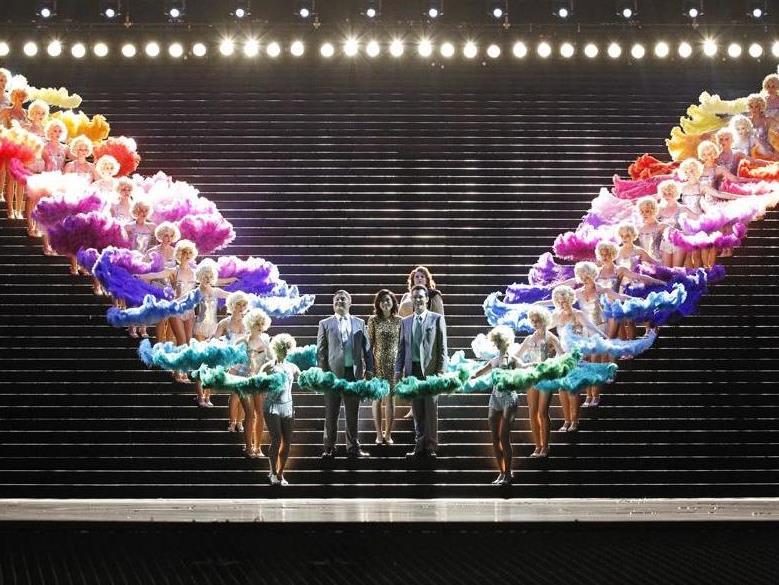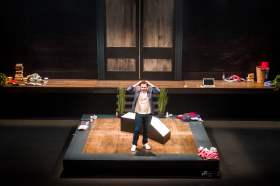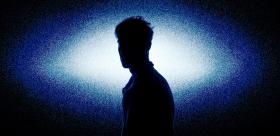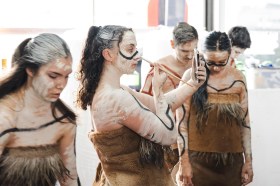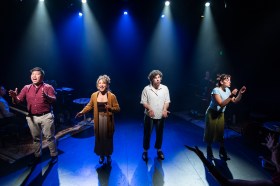Image: Andrew Moran as Donner, Hyeseoung Kwon as Freia, Jacqueline Dark as Fricka, Andrew Brunsdon as Froh and Rainbow Girls. Photo: Jeff Busby
In his program notes director Neil Armfield says the Ring’s ‘magic of transformation’ will be understood in the ‘playful frames and gestures of the theatre’.
Armfield had also said earlier he works with an economy of means to tell the story simply and dramatically. As with his direction earlier this year of another classic The Summer of the Seventeenth Doll, where he stripped away the nostalgic baggage of 1950s Melbourne to let the drama emerge from a near bare stage, he does much the same in his vision of Wagner’s equally baggage ridden masterpiece.
The opening scene in the Rhine, depicted on a revolving stage where over 100 sleeping bodies in assorted swimwear seem to come alive to represent the rippling water, suggests the creation of life itself.
From their midst emerges three rheinmaidens dressed as old-style burlesque dancers. The embodiment of everything glamorous and unattainable, they taunt Alberich with a hoochie-coochie dance routine and, at one point mimicked by the human river, it looked as though the water even joined in mocking him.
When the gold is revealed this ‘Sea of Humanity’ slowly releases shimmering, cheerleader pom-poms, transforming them into a gleaming river, in the first of many magical transformations which are often literal. A magician’s cabinet – complete with top-hatted magician and glamorous assistant – represents the transforming power of Alberich’s magic helmet.
The giants appear on cherry-pickers, crashing through an old-fashioned painted backcloth referencing the scenic art of the Ring Cycle of the 1870s, in what must be a deliberate gesture of iconoclasm and finally, the world of burlesque is referenced once more for the opera’s conclusion as the gods’ process up a magnificent flight of steps; here their rainbow bridge is a Ziegfeld folly of fan-dancers.
Alice Babidge’s costumes blend the mythological and modern worlds, depicting the gods as a corporate family. The cast rose to the challenge of performing characters transformed from the traditional. In a cheap suit, Alberich seemed like a frustrated accountant who, after gaining the Ring, finds himself the megalomaniac head of the corporation. Warwick Fyfe played and sung the role with astounding physical and vocal imagination, gloating, snarling and finally raging in despair. This Alberich was also tragic, like a Shakespearean usurper king whose pride causes his downfall. His curse was also tellingly played. Grabbing Wotan’s spear and delivered with such vehemence the image will probably recur in the viewer’s mind each time the musical motif of the curse is recalled in the subsequent operas.
At 70 and with long experience in the role Terje Stensvold sings and acts Wotan with an authority rarely encountered these days. Richard Berkeley-Steele as Loge brings the same kind of authority, savouring every word of the text. The scenes between him, Stensvold and Fyfe are such lessons in singing that they seem to slip by with no sense of that much maligned and feared Wagnerian tedium.
Jacqueline Dark as Fricka makes a great deal of the role and also delves into the text to allow it to colour her singing. Hyeseoung Kwon’s glorious soprano gleams like the gold that is so much a part of her character and predicament. As the goddess of youth who keeps the gods young with golden apples, she is dressed in gold and surrounded in gold as part of a hostage deal.
Although gold is associated throughout the operas as desirable, dangerous and destructive, the orchestra is the true gold of this cycle. Amassed from orchestras around the country and the world it is truly amazing to hear. Swelling with the specialised Ring Cycle instruments the sound is extraordinary and conductor Pietari Inkinen guides it beautifully through every layer of the multi-faceted score.
Judging from the effect of just the first opera, this Ring Cycle has delivered everything it promised and more.
5 Stars
A limited number of tickets for the Ring Cycle are on sale from 9am on the first day of each Cycle on November 27 and December 6. Further information available at: melbourneringcycle.com.au
